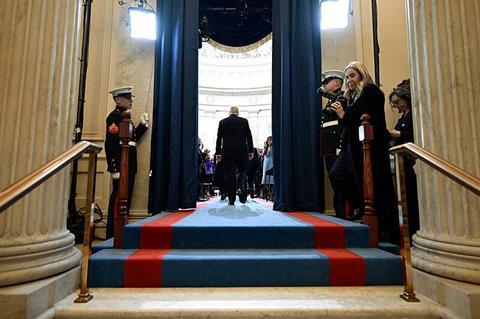The World Health Organization has said it regrets the announcement that the United States of America intends to withdraw from the Organization.

President Donald Trump made the announcement on Monday, saying the global health agency had mishandled the COVID-19 pandemic and other international health crises.
Trump said the WHO had failed to act independently from the “inappropriate political influence of WHO member states” and required “unfairly onerous payments” from the U.S. that were disproportionate to the sums provided by other, larger countries, such as China.
“World Health ripped us off, everybody rips off the United States. It’s not going to happen anymore,” Trump said at the signing of an executive order on the withdrawal, shortly after his inauguration to a second term.
Crucial role
WHO said it plays a crucial role in protecting the health and security of the world’s people, including Americans, by addressing the root causes of disease, building stronger health systems, and detecting, preventing and responding to health emergencies, including disease outbreaks, often in dangerous places where others cannot go.
READ MORE: Call for urgent, high-level action to address global scourge of antimicrobial resistance
READ MORE: WHO pays tribute to polio-eradication leader Aidan O’Leary
“The United States was a founding member of WHO in 1948 and has participated in shaping and governing WHO’s work ever since, alongside 193 other Member States, including through its active participation in the World Health Assembly and Executive Board,” a spokesperson said.
“For over seven decades, WHO and the USA have saved countless lives and protected Americans and all people from health threats. Together, we ended smallpox, and together we have brought polio to the brink of eradication. American institutions have contributed to and benefited from membership in WHO.
Reform process
“With the participation of the United States and other Member States, WHO has over the past 7 years implemented the largest set of reforms in its history, to transform our accountability, cost-effectiveness, and impact in countries. This work continues.
“We hope the United States will reconsider and we look forward to engaging in constructive dialogue to maintain the partnership between the USA and WHO, for the benefit of the health and well-being of millions of people around the globe.”
When asked about Trump’s decision and remarks, China’s foreign ministry told a regular press briefing on Tuesday that the role of the WHO in global health governance should only be strengthened, not weakened.
“China will continue to support the WHO in fulfilling its responsibilities, and deepen international public health cooperation,” said Guo Jiakun, a ministry spokesperson.
Programs at risk
The move means the U.S. will leave the United Nations health agency in 12 months’ time and stop all financial contributions to its work. The United States is by far the WHO’s biggest financial backer, contributing around 18% of its overall funding. WHO’s most recent two-year budget, for 2024-2025, was $6.8 billion.
Reuters reports that The U.S. departure will likely put at risk programs across the organization, according to several experts both inside and outside the WHO, notably those tackling tuberculosis, the world’s biggest infectious disease killer, as well as HIV/AIDS and other health emergencies.
Trump’s order said the administration would cease negotiations on the WHO pandemic treaty while the withdrawal is in progress. U.S. government personnel working with the WHO will be recalled and reassigned, and the government will look for partners to take over necessary WHO activities, according to the order.The government will review, rescind, and replace the 2024 U.S. Global Health Security Strategy as soon as practicable, the order said.
Key donors
The next-largest donors to the WHO are the Bill & Melinda Gates Foundation, although most of that funding goes to polio eradication, and the global vaccine group Gavi, followed by the European Commission and the World Bank. The next-largest national donor is Germany, which contributes around 3% of the WHO’s funding.
Trump’s withdrawal from the WHO is not unexpected. He took steps to quit the body in 2020, during his first term as president, accusing the WHO of aiding China’s efforts to “mislead the world” about the origins of COVID. WHO vigorously denies the allegation and says it continues to press Beijing to share data to determine whether COVID emerged from human contact with infected animals or due to research into similar viruses in a domestic laboratory.
Trump also suspended U.S. contributions to the agency, costing it nearly $200 million in 2020-2021 versus the previous two-year budgets, as it battled the world’s worst health emergency in a century.Under U.S. law, leaving the WHO requires a one-year notice period, and the payment of any outstanding fees. Before the U.S. withdrawal could be completed last time, Joe Biden won the country’s presidential election and put a stop to it on his first day in office on Jan. 20, 2021.







No comments yet